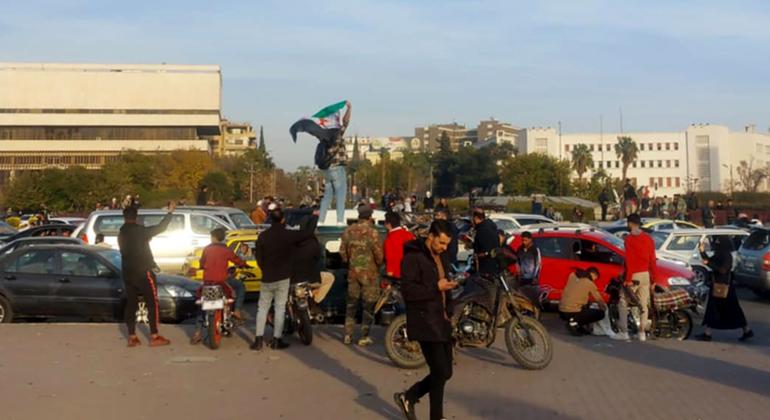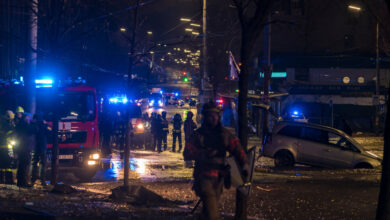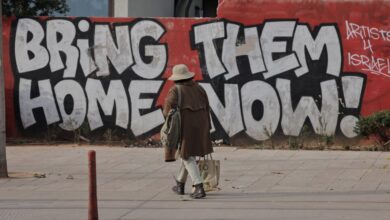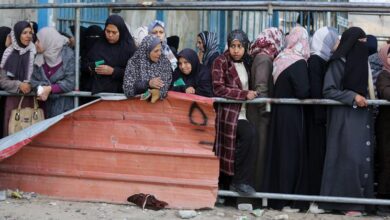Will those responsible for atrocities in Syria finally face justice?

For years, United Nations human rights agencies have documented, tracked and published reports of abuses, bringing Syria’s dismal human rights record to the world’s attention.
The fall of Bashar al Assad in December 2024 was largely greeted with euphoria by Syrians, but images of hundreds pouring into the notorious Sednaya Prison, desperately searching for friends or relatives and Testimony from former prisoners, recounting the brutality and torture they endured, is a vivid reminder of the crimes committed under the old regime.
Since 2016, the International Independent and Impartial Mechanism (IIIM), has gathered a large body of evidence to ensure that those responsible are ultimately held accountable.
In the eight years since they were repeatedly denied access to Syria, they have had to work from outside the country.
However, everything changed after the rapid collapse of the regime. Just a few days later, the head of IIIM, Robert Petit, was able to travel to Syria, where he met with members of the de facto regime. During this historic visit, he emphasized the importance of preserving evidence before it is lost forever.
UN News interviewed Mr. Petit from his office in Geneva and began by asking him to describe the reactions of the Syrians he met during his visit.
This interview has been edited for clarity and length.
Robert Petit: It was a sobering and emotional time. I experienced joy mixed with hope, as well as fear and anxiety, as well as a lot of sadness from the families of the murdered prisoners.
But there is certainly a widespread sense of change. I personally hope that the aspirations of the Syrian people will be fully realized with the help of the international community.
UN News: What was the purpose of your visit and was it successful?
Robert Petit: Like most of the world, we were shocked by the speed with which the regime collapsed, even though we should have realized that the foundations had been completely eroded over the years.
We had to quickly start thinking about how to deal with this new situation: for the first time in eight years, we had a chance to actually complete our mission.
The main purpose of the visit is to initiate diplomatic engagement and explain to the new administration what our role is, what we want to do and what we are allowed to do. We found them receptive.
We officially requested permission to send teams to work and carry out our mission in Syria. That happened on December 21. We are still waiting for an answer. I have no reason to believe that we will not be licensed. I think it’s a matter of process rather than willingness and we’re hoping that within a few days we’ll get that authorization and then we’ll roll it out as soon as possible.

Documents piled up at the court in Damascus, Syria, where IIIM head Robert Petit visited.
UN News: How difficult was it to collect evidence during the years you were denied entry into the country?
Robert Petit: Syrian civil society and Syrians in general have, since March 2011, been the best chroniclers of their own victimhood. They accumulate large amounts of evidence of crimes, often at the cost of their own lives.
Every year since we were founded, we have tried to reach Syria. We were not able to obtain permission, but we have developed close relationships with a number of civil society organizations, media stakeholders and individuals who have gathered credible evidence, as well like other organizations.
We have accumulated more than 284 terabytes of data over the years to build cases and assist 16 different jurisdictions in prosecuting, investigating and prosecuting their own cases.
We now have access to a wealth of new criminal evidence and we hope to be able to exploit that opportunity soon.
UN News: However, during the Assad years, you had no guarantees that anyone would be brought to justice.
Robert Petit: Our mission has been clear from the beginning: prepare cases to support current and future jurisdictions. And that’s what we’ve been doing. There is always hope that there will be some kind of tribunal or comprehensive justice for the crimes in Syria. In anticipation of that, we have built cases and we hope to build a lot of insight into the situation and evidence that can support these cases.
At the same time, we have assisted 16 jurisdictions around the world in prosecuting these cases and I am pleased to say that we have been able to assist in over 250 of those investigations and prosecutions and will continue to do so.
UN News: During the trip, you said there was a small window of opportunity to protect the sites and the documents they hold. Why?
Robert Petit: The Syrian state apparatus has been operating for many years so there will be a lot of evidence but there are things that are lost, they are destroyed and disappear. So there is a timing issue.
UN News: Did the de facto regime in Syria help you gather evidence?
Robert Petit: We have received messages from the caretaker authorities that they are aware of the importance of preserving all this evidence. The reality is they’ve only been in control for six weeks, so there are clearly a lot of competing priorities.
I think the situation in Damascus is relatively good because many locations, at least the main ones, are secure. Outside of Damascus, I think the situation is a lot looser and probably worse.
UN News: When Volker Türk, the UN High Commissioner for Human Rights, visited Syria in January, he called for justice after the end of the Assad regime. But he also said that the level of atrocities was “a beggar’s belief.” Do you personally think that justice rather than revenge, in a place where people have been so brutalized, is possible?
Robert Petit: It is for the Syrians to answer for themselves and hopefully be heard and supported in what they will define as justice for them and for what they have endured.
If people are given hope that there will be a fair and transparent system of dealing with at least those primarily responsible for atrocities, it will give them hope and patience.
I think it’s possible. I have worked enough in these situations to know that many different things can be done to resolve these very complex situations, but it has to be Syria-led and they have to have the support of the community international.
UN News: Do you envision that criminal trials will take place in Syria at the national or international level, for example in court? International Criminal Court?
Robert Petit: Again, that will depend on what the Syrians want. You’re talking about thousands of perpetrators and an entire state apparatus dedicated to committing mass atrocities. It is an incredible challenge to define what accountability means.
In my opinion, those with the highest responsibility, the architects of the system, must bear criminal responsibility. For others, the way a post-conflict society deals with the problem will be different.
For example, Rwanda has tried to use traditional forms of dispute resolution to try 1.2 million perpetrators for more than a decade. Others, like Cambodia, simply try to bury the past and pretend it never happened.
The best solution is one that Syrians will decide for themselves.




